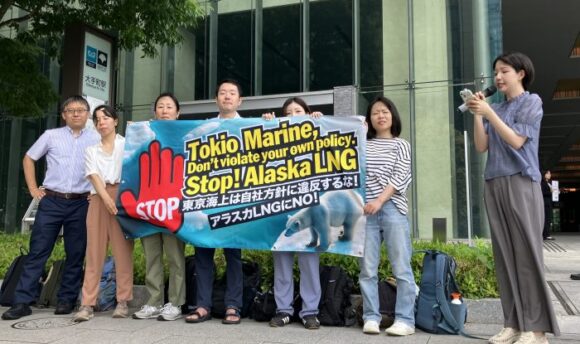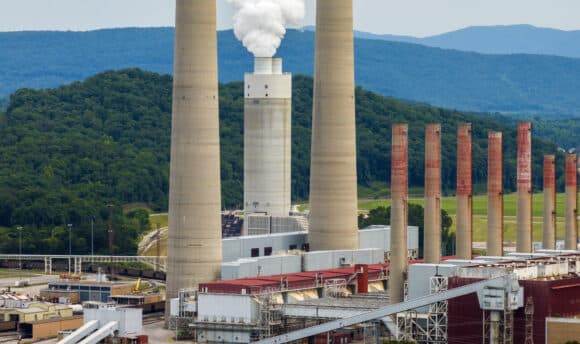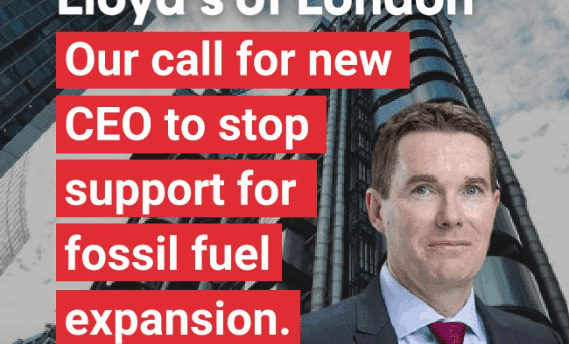Monday 24 Oct 2022 – As the global reinsurance sector meets to discuss annual re/insurance contract renewals in Baden-Baden, the Insure Our Future campaign calls on the assembled reinsurers to stop fueling climate catastrophe by underwriting coal, oil and gas production and instead support a rapid transition to renewable energy.
Munich Re reported that climate disasters caused estimated losses of $280 billion in 2021, the second-costliest ever for the insurance sector, up from $210 bn in 2020 and $166 bn in 2019.
“Reinsurers play a foundational role in enabling the coal, oil and gas production that fuels climate disasters. Without insurance, new fossil fuel projects would be impossible. Reinsurers must immediately rule out both facultative and treaty reinsurance for new coal, oil and gas and commit to phase down existing cover in line with climate science and pathways targeting 1.5C.”
The campaign highlighted new analysis showing that Hannover Re, Swiss Re, Allianz and most recently Munich Re have shown leadership by adopting policies ruling out support for new oil and gas projects, and called on the remaining laggards to follow their lead. It singled out Berkshire Hathaway and Lloyd’s of London as two of the last major insurers still underwriting the expansion of the coal industry. The two insurers ranked joint last and second last, respectively, in Insure Our Future’s recent assessment of insurers’ fossil fuel policies.
“We have seen action to exclude fossil fuels by quite a few reinsurers now. Yet many of those assembled in Baden-Baden have not taken such steps. Rather than discussing how to pass the rising costs of climate disasters on to their customers, they need to limit the damage by excluding fossil fuel clients."
The campaign also put the spotlight on the controversial East African Crude Oil Pipeline (EACOP) and its insurance broker, Marsh, represented in Baden-Baden by their sister company Guy Carpenter, which will host a symposium and cocktail reception to mark the start of the event.
EACOP is expected to generate an additional 34 million tonnes of CO2 per year at peak production, take farming land from 100,000 people and risk oil spills and leaks into Lake Victoria, on which more than 40m people depend for water and food production. Twenty four banks, eighteen (re)insurers, and four export credit agencies have already denied support for EACOP, while over a hundred of Marsh McLennan’s own employees have written to the company’s leadership urging them to steer clear of EACOP.
Insure Our Future calls on the reinsurers assembled in Baden-Baden to join the growing number of firms that have ruled out involvement with EACOP, and urge Marsh McLennan’s CEO Daniel Glaser to listen to his employees and the scientific community, which has made clear that there is no room for EACOP or any new oil and gas projects in a 1.5C pathway.
###
Additional resources:
1) Insure Our Future last week released an annual scorecard rating the fossil fuel insurance and investment policies of 30 leading re/insurers.
2) Baden-Baden blog by Lindsay Keenan, Insure Our Future
- “Despite paying out billions more than they had anticipated for the increasingly severe and frequent catastrophes caused by climate change and despite the wider human, biodiversity and economic damage caused by these climate catastrophes, many reinsurers continue to reinsure and invest in fossil fuel companies.”
- “Reinsurance companies have known for decades that their actions help to cause climate change but continue to provide the reinsurance cover that enables the extraction and burning of oil and gas at levels that will drive global warming way above 1.5C and continues to invest in fossil fuels companies.”
3) Who pays for a hurricane? by Peter Bosshard, Insure Our Future
Here’s how insurers could make polluters pay and keep climate risks affordable:
- “As the costs of climate disasters mount, insurance companies should explore ways how they can bring … claims against the companies which are driving climate-related losses through their carbon emissions. They should, in other words, explore how they can make big polluters pay their fair share for the costs of hurricanes like Ian.”
- “Through subrogation claims insurers could make polluters pay. They could keep insurance affordable for communities exposed to climate risks and send a stark message to carbon majors that they need to reconsider their role in extracting and burning fossil fuels.”
4) IPCC Report on Climate Change Mitigation (April 2022) by Intergovernmental Panel on Climate Change (IPCC)
- “Restricting global warming to 1.5°C is nearly out of reach unless radical action is taken to peak global greenhouse gas (GHG) emissions as soon as possible. We must reach peak greenhouse gas emissions globally by 2025 in order to limit warming to 1.5°C, and that delaying a peak past 2025 means unavoidable and unnecessary economic losses.
- Current and planned fossil fuel infrastructure will make a 1.5°C future impossible. Mitigation efforts will, therefore, necessitate leaving fossil fuels unburned and considerable infrastructure stranded, highlighting the importance of a just transition.”



